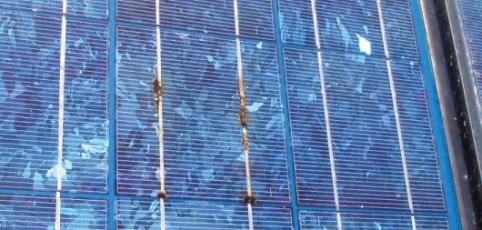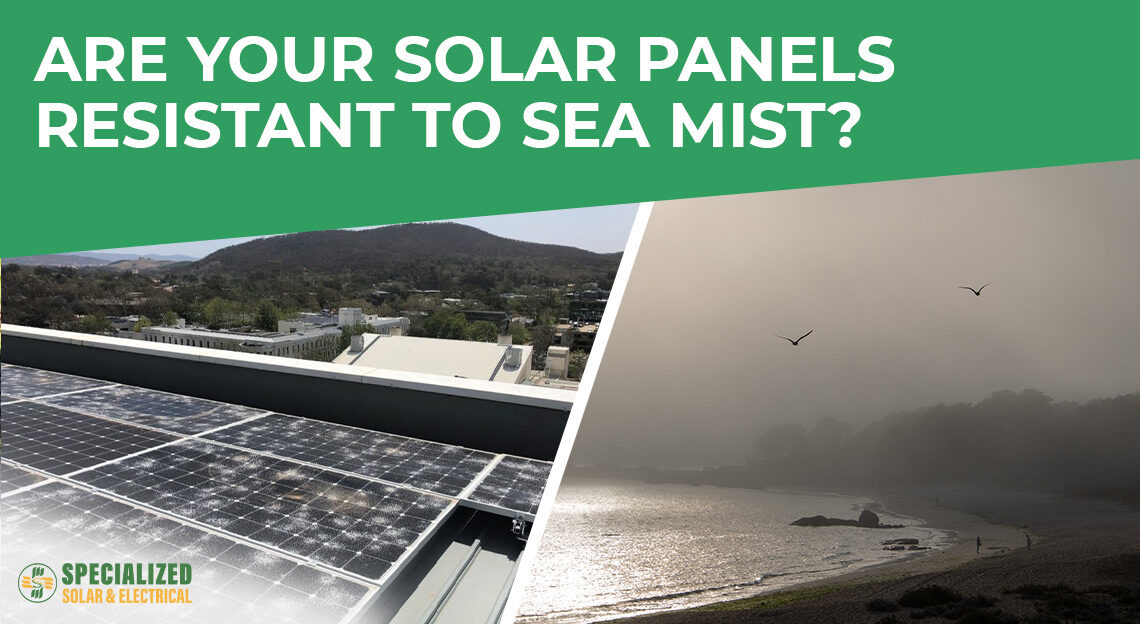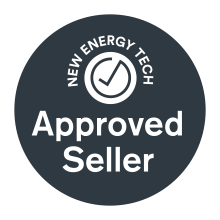Do you live by the sea and are you thinking of installing solar panels? If so, did you know that cheaper solar panels can be highly susceptible to corrosion from sea mist? And that this corrosion can reduce the power output of solar panels by at least 6 per cent 1?
The solution to sea mist corrosion is to install quality corrosion-resistant solar panels that are certified to perform efficiently close the sea. The best solar panels, like REC Alpha Pure Series, are certified at the highest possible level for resistance to corrosion from salty air and sea mist.
Discover on this blog, whether the solar panels on your home are likely to be affected based on your proximity to the sea. And if so, the parts of a solar panel that are most likely to degrade if your panels are not sea mist corrosion resistant. Finally, find out what certification your solar panels need to have so they keep working efficiently for years to come, despite being surrounded by the bracing sea air!
On this blog:
- How close to the sea matters for solar panels?
- Which parts of the solar panel can sea mist corrode?
- What is the sea mist rating for solar panels?
- What are the six levels of sea mist corrosion resistance?
- Are all solar panels sold in Australia rated to perform well in sea mist?
- Which level of sea mist corrosion resistance does the Clean Energy Council recommend?
- What about sea salt sticking to solar panels?
- How can I ensure my solar panels are resistant to sea mist?
How close to the sea matters for solar panels?
According to the Clean Energy Council, anyone living up to 500 metres from the sea should be installing sea mist corrosion resistant solar panels. In their words:
Which parts of the solar panel can sea mist corrode?
Sea mist is a corrosive agent that can damage the metal components of a solar panel causing the power output to drop. In the worst case, the panel may fail altogether.
The parts of a solar panels that can be corroded by sea mist are:
- Wiring and electrical contacts
- Junction box
- Metal frames
Salt corrosion can affect the wiring, electrical contacts, and junction box. Galvanic corrosion, caused when two different metals come in contact with each other, can corrode the metal frames that the solar panels are mounted on. This is why solar panels need to be made with marine grade aluminium, which is corrosion resistant.

What is the sea mist rating for solar panels?
The certification standard for sea mist corrosion resistance for solar panels is known as IEC 61701. The International Electrotechnical Commission, or IEC, has created the standard for sea mist resistance for solar panels. Solar panels must have the IEC 61701 accreditation in order to be suitable for installation close to the sea.
What are the six levels of sea mist corrosion resistance?
There are six levels of corrosion resistance specified in the IEC 61701 standard for solar panels:
- Level 1 is the lowest level of corrosion protection from sea mist
- Level 2 isn’t normally used
- Levels 3 to 6 indicate increasing levels of resistance to corrosion from sea mist
- Level 6 rating is for solar panels that have survived 112 days of testing that simulate decade of exposure to salty environment with less than a 2 per cent decline in power output
Are all solar panels sold in Australia rated to perform well in sea mist?
No, many of the cheaper solar panels sold in Australia – including many of those on the CEC approved solar panel list – do not have a sea mist rating and do not meet the international standard for resistance to sea mist corrosion.
Which level of sea mist corrosion resistance does the Clean Energy Council recommend?
Because so many Australian homes and businesses are near the sea, the Clean Energy Council has added an enhanced listing for approved solar panels covering sea mist corrosion resistance. On this enhanced listing, the CEC states that from April 1 2020, they only list solar panels that pass the highest level of sea mist resistance – which is Level 6.
Interestingly, this higher standard for solar panels reduces the number of suitable solar panels for seaside properties to a much shorter list. In fact, of the 4859 solar panels listed on the CEC approved solar panels directory, only 13 per cent of these solar panels pass the Level 6 standard for sea mist corrosion resistance.
What about sea salt sticking to solar panels?
Even the best sea-salt resistant solar panels will need regular cleaning to ensure that sea grime doesn’t affect the power output of the solar panels. Sea salt sticking to solar panels will reduce the amount of sunlight reaching the panels. The only way to avoid this happening is to get your solar panels professionally cleaned approximately once a year if you live by the sea.
How can I ensure my solar panels are resistant to corrosion from sea mist?
There are three ways to ensure the solar panels you get installed on your seaside property are resistant to corrosion from sea mist:
- Make sure your solar panels are accredited for Level 6 corrosion resistance under the IEC 61701 standard.
- Only use CEC solar installers who have a proven track record installing solar panel systems for beachside properties. That way, you minimise the risk of galvanic corrosion caused by the metal frame of the solar panel touching another metal object.
- Ask your CEC installer for a recommended solar panel cleaning and maintenance schedule as well as comprehensive solar monitoring. That way you’ll be sure that your panels are in tip top working order.
Get a solar quote for your seaside property
At Specialized Solar & Electrical, we have installed thousands of solar systems on properties near the sea including Melbourne bayside suburbs, the Mornington Peninsula and across the whole of Victoria including the Surf Coast.
We know the challenges caused by salt mist corrosion on solar panel performance, that’s why we recommend REC Alpha Pure Series solar panels for any property near the sea. REC Alpha Pure panels pass the Level 6 test for corrosion resistance under the IEC 61701 standard and are warrantied to provide superior levels of power output for 25 years.
We can also help with ongoing solar panel maintenance and cleaning to keep your solar panels in optimal working order.
Don’t let sea mist corrosion affect your solar system. Contact us for an obligation-free quote today!
1 Source: PV Magazine, ‘What sea water and salt spray can do to a PV system’, September 8, 2021












